University Debate Script: Bariatric Surgery for Morbid Obesity
VerifiedAdded on 2022/09/14
|6
|1300
|10
Homework Assignment
AI Summary
This debate script presents a student's argument in favor of bariatric surgery for morbidly obese individuals, emphasizing the health risks associated with morbid obesity, such as high blood pressure, diabetes, and cardiovascular diseases. The script highlights the limitations of non-invasive weight loss techniques for this population and the potential benefits of bariatric surgery, including significant weight loss and reduced obesity-related comorbidities. It references studies supporting the effectiveness of bariatric surgery and addresses the importance of considering the bioethics of beneficence and non-maleficence. The script concludes by advocating for bariatric surgery alongside patient education for sustained weight loss and healthy lifestyle interventions.
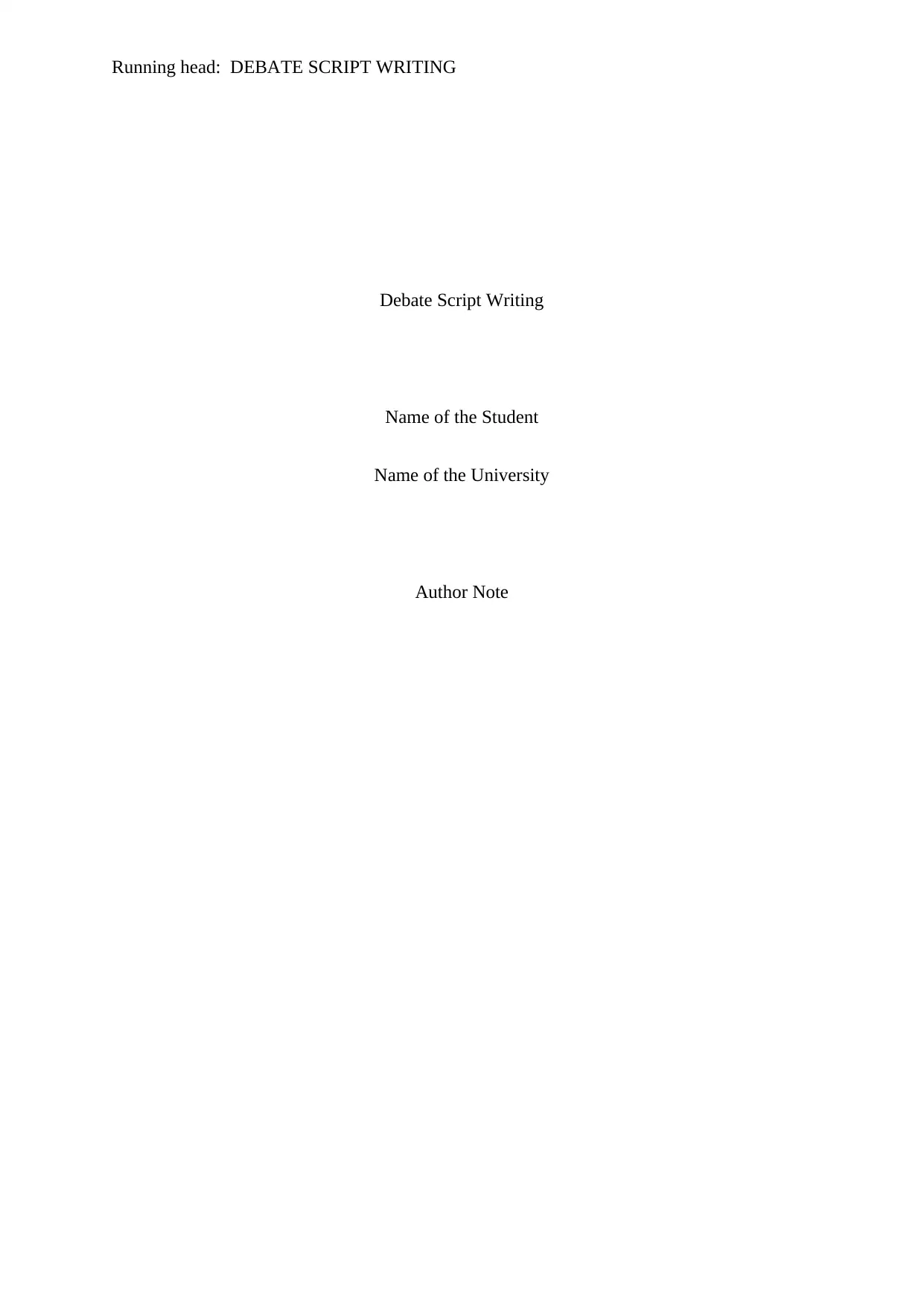
Running head: DEBATE SCRIPT WRITING
Debate Script Writing
Name of the Student
Name of the University
Author Note
Debate Script Writing
Name of the Student
Name of the University
Author Note
Paraphrase This Document
Need a fresh take? Get an instant paraphrase of this document with our AI Paraphraser
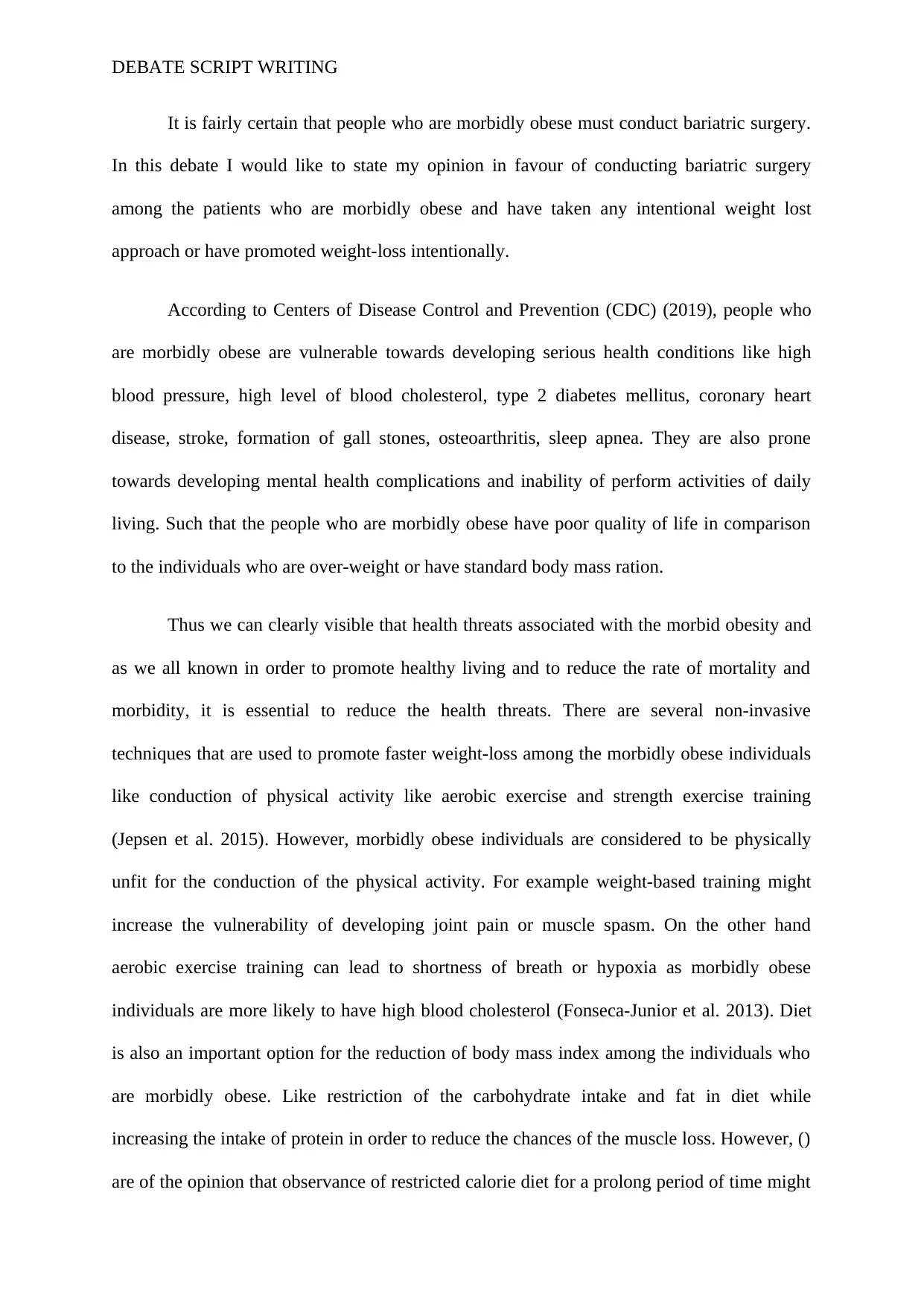
DEBATE SCRIPT WRITING
It is fairly certain that people who are morbidly obese must conduct bariatric surgery.
In this debate I would like to state my opinion in favour of conducting bariatric surgery
among the patients who are morbidly obese and have taken any intentional weight lost
approach or have promoted weight-loss intentionally.
According to Centers of Disease Control and Prevention (CDC) (2019), people who
are morbidly obese are vulnerable towards developing serious health conditions like high
blood pressure, high level of blood cholesterol, type 2 diabetes mellitus, coronary heart
disease, stroke, formation of gall stones, osteoarthritis, sleep apnea. They are also prone
towards developing mental health complications and inability of perform activities of daily
living. Such that the people who are morbidly obese have poor quality of life in comparison
to the individuals who are over-weight or have standard body mass ration.
Thus we can clearly visible that health threats associated with the morbid obesity and
as we all known in order to promote healthy living and to reduce the rate of mortality and
morbidity, it is essential to reduce the health threats. There are several non-invasive
techniques that are used to promote faster weight-loss among the morbidly obese individuals
like conduction of physical activity like aerobic exercise and strength exercise training
(Jepsen et al. 2015). However, morbidly obese individuals are considered to be physically
unfit for the conduction of the physical activity. For example weight-based training might
increase the vulnerability of developing joint pain or muscle spasm. On the other hand
aerobic exercise training can lead to shortness of breath or hypoxia as morbidly obese
individuals are more likely to have high blood cholesterol (Fonseca-Junior et al. 2013). Diet
is also an important option for the reduction of body mass index among the individuals who
are morbidly obese. Like restriction of the carbohydrate intake and fat in diet while
increasing the intake of protein in order to reduce the chances of the muscle loss. However, ()
are of the opinion that observance of restricted calorie diet for a prolong period of time might
It is fairly certain that people who are morbidly obese must conduct bariatric surgery.
In this debate I would like to state my opinion in favour of conducting bariatric surgery
among the patients who are morbidly obese and have taken any intentional weight lost
approach or have promoted weight-loss intentionally.
According to Centers of Disease Control and Prevention (CDC) (2019), people who
are morbidly obese are vulnerable towards developing serious health conditions like high
blood pressure, high level of blood cholesterol, type 2 diabetes mellitus, coronary heart
disease, stroke, formation of gall stones, osteoarthritis, sleep apnea. They are also prone
towards developing mental health complications and inability of perform activities of daily
living. Such that the people who are morbidly obese have poor quality of life in comparison
to the individuals who are over-weight or have standard body mass ration.
Thus we can clearly visible that health threats associated with the morbid obesity and
as we all known in order to promote healthy living and to reduce the rate of mortality and
morbidity, it is essential to reduce the health threats. There are several non-invasive
techniques that are used to promote faster weight-loss among the morbidly obese individuals
like conduction of physical activity like aerobic exercise and strength exercise training
(Jepsen et al. 2015). However, morbidly obese individuals are considered to be physically
unfit for the conduction of the physical activity. For example weight-based training might
increase the vulnerability of developing joint pain or muscle spasm. On the other hand
aerobic exercise training can lead to shortness of breath or hypoxia as morbidly obese
individuals are more likely to have high blood cholesterol (Fonseca-Junior et al. 2013). Diet
is also an important option for the reduction of body mass index among the individuals who
are morbidly obese. Like restriction of the carbohydrate intake and fat in diet while
increasing the intake of protein in order to reduce the chances of the muscle loss. However, ()
are of the opinion that observance of restricted calorie diet for a prolong period of time might
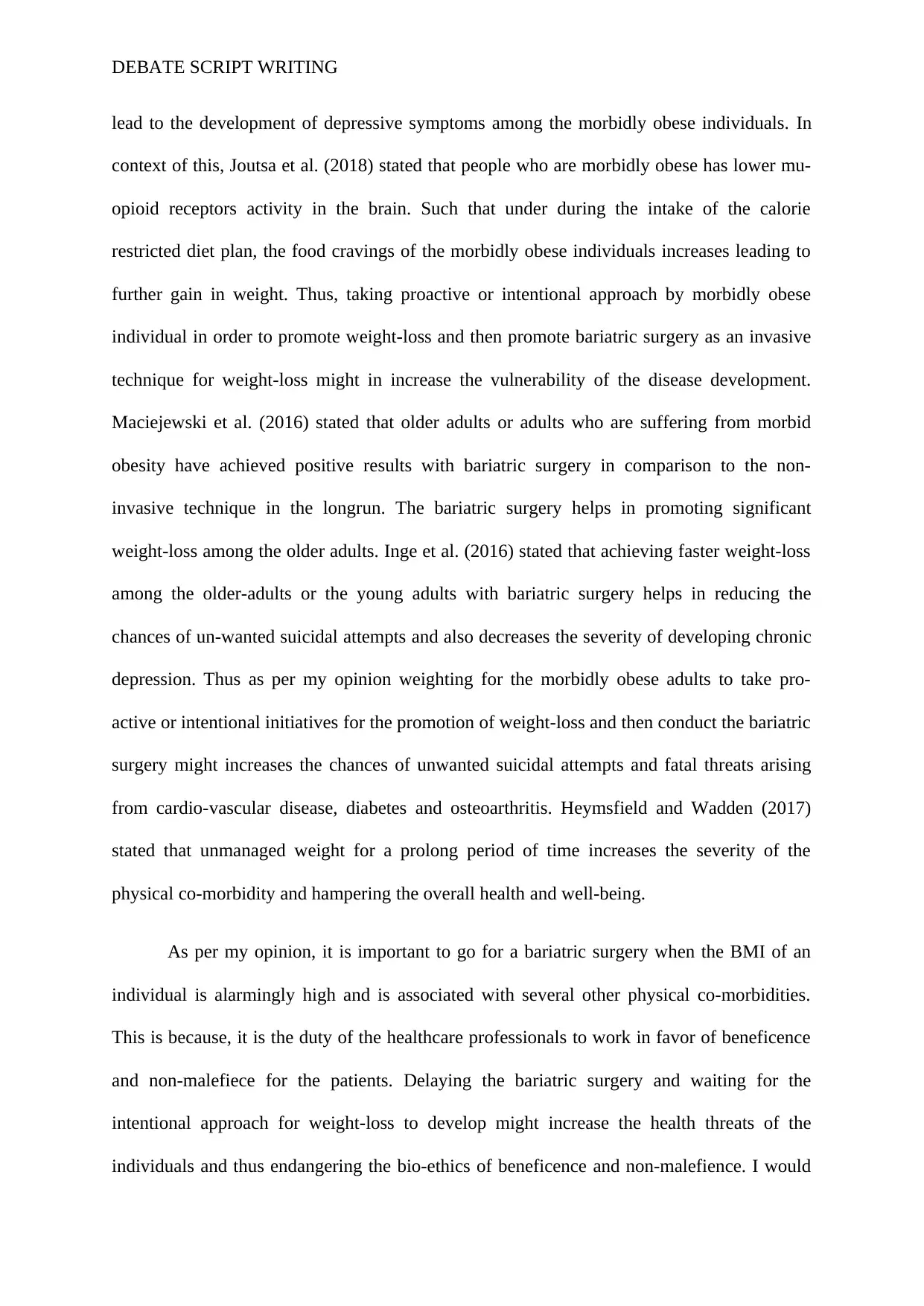
DEBATE SCRIPT WRITING
lead to the development of depressive symptoms among the morbidly obese individuals. In
context of this, Joutsa et al. (2018) stated that people who are morbidly obese has lower mu-
opioid receptors activity in the brain. Such that under during the intake of the calorie
restricted diet plan, the food cravings of the morbidly obese individuals increases leading to
further gain in weight. Thus, taking proactive or intentional approach by morbidly obese
individual in order to promote weight-loss and then promote bariatric surgery as an invasive
technique for weight-loss might in increase the vulnerability of the disease development.
Maciejewski et al. (2016) stated that older adults or adults who are suffering from morbid
obesity have achieved positive results with bariatric surgery in comparison to the non-
invasive technique in the longrun. The bariatric surgery helps in promoting significant
weight-loss among the older adults. Inge et al. (2016) stated that achieving faster weight-loss
among the older-adults or the young adults with bariatric surgery helps in reducing the
chances of un-wanted suicidal attempts and also decreases the severity of developing chronic
depression. Thus as per my opinion weighting for the morbidly obese adults to take pro-
active or intentional initiatives for the promotion of weight-loss and then conduct the bariatric
surgery might increases the chances of unwanted suicidal attempts and fatal threats arising
from cardio-vascular disease, diabetes and osteoarthritis. Heymsfield and Wadden (2017)
stated that unmanaged weight for a prolong period of time increases the severity of the
physical co-morbidity and hampering the overall health and well-being.
As per my opinion, it is important to go for a bariatric surgery when the BMI of an
individual is alarmingly high and is associated with several other physical co-morbidities.
This is because, it is the duty of the healthcare professionals to work in favor of beneficence
and non-malefiece for the patients. Delaying the bariatric surgery and waiting for the
intentional approach for weight-loss to develop might increase the health threats of the
individuals and thus endangering the bio-ethics of beneficence and non-malefience. I would
lead to the development of depressive symptoms among the morbidly obese individuals. In
context of this, Joutsa et al. (2018) stated that people who are morbidly obese has lower mu-
opioid receptors activity in the brain. Such that under during the intake of the calorie
restricted diet plan, the food cravings of the morbidly obese individuals increases leading to
further gain in weight. Thus, taking proactive or intentional approach by morbidly obese
individual in order to promote weight-loss and then promote bariatric surgery as an invasive
technique for weight-loss might in increase the vulnerability of the disease development.
Maciejewski et al. (2016) stated that older adults or adults who are suffering from morbid
obesity have achieved positive results with bariatric surgery in comparison to the non-
invasive technique in the longrun. The bariatric surgery helps in promoting significant
weight-loss among the older adults. Inge et al. (2016) stated that achieving faster weight-loss
among the older-adults or the young adults with bariatric surgery helps in reducing the
chances of un-wanted suicidal attempts and also decreases the severity of developing chronic
depression. Thus as per my opinion weighting for the morbidly obese adults to take pro-
active or intentional initiatives for the promotion of weight-loss and then conduct the bariatric
surgery might increases the chances of unwanted suicidal attempts and fatal threats arising
from cardio-vascular disease, diabetes and osteoarthritis. Heymsfield and Wadden (2017)
stated that unmanaged weight for a prolong period of time increases the severity of the
physical co-morbidity and hampering the overall health and well-being.
As per my opinion, it is important to go for a bariatric surgery when the BMI of an
individual is alarmingly high and is associated with several other physical co-morbidities.
This is because, it is the duty of the healthcare professionals to work in favor of beneficence
and non-malefiece for the patients. Delaying the bariatric surgery and waiting for the
intentional approach for weight-loss to develop might increase the health threats of the
individuals and thus endangering the bio-ethics of beneficence and non-malefience. I would
⊘ This is a preview!⊘
Do you want full access?
Subscribe today to unlock all pages.

Trusted by 1+ million students worldwide
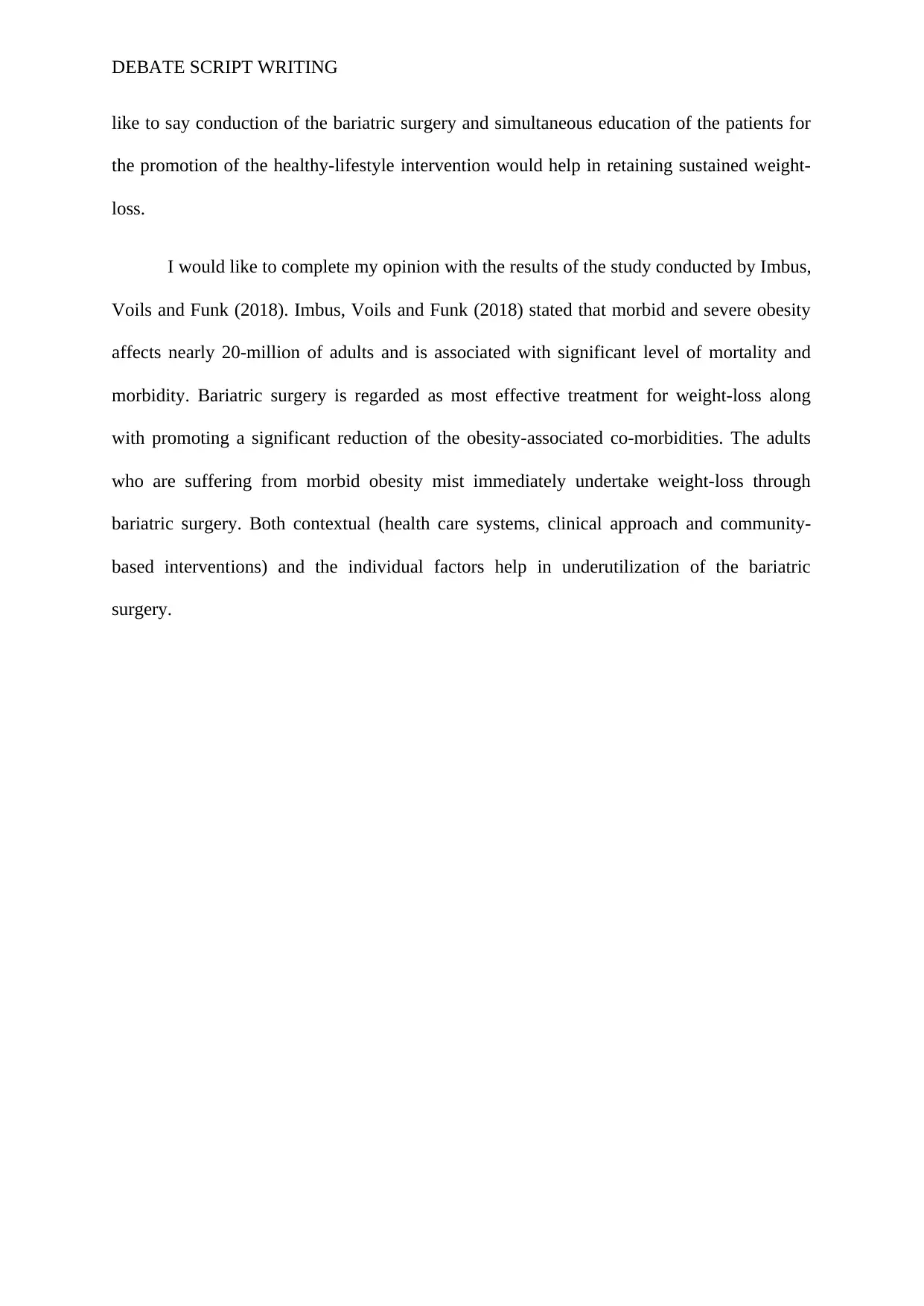
DEBATE SCRIPT WRITING
like to say conduction of the bariatric surgery and simultaneous education of the patients for
the promotion of the healthy-lifestyle intervention would help in retaining sustained weight-
loss.
I would like to complete my opinion with the results of the study conducted by Imbus,
Voils and Funk (2018). Imbus, Voils and Funk (2018) stated that morbid and severe obesity
affects nearly 20-million of adults and is associated with significant level of mortality and
morbidity. Bariatric surgery is regarded as most effective treatment for weight-loss along
with promoting a significant reduction of the obesity-associated co-morbidities. The adults
who are suffering from morbid obesity mist immediately undertake weight-loss through
bariatric surgery. Both contextual (health care systems, clinical approach and community-
based interventions) and the individual factors help in underutilization of the bariatric
surgery.
like to say conduction of the bariatric surgery and simultaneous education of the patients for
the promotion of the healthy-lifestyle intervention would help in retaining sustained weight-
loss.
I would like to complete my opinion with the results of the study conducted by Imbus,
Voils and Funk (2018). Imbus, Voils and Funk (2018) stated that morbid and severe obesity
affects nearly 20-million of adults and is associated with significant level of mortality and
morbidity. Bariatric surgery is regarded as most effective treatment for weight-loss along
with promoting a significant reduction of the obesity-associated co-morbidities. The adults
who are suffering from morbid obesity mist immediately undertake weight-loss through
bariatric surgery. Both contextual (health care systems, clinical approach and community-
based interventions) and the individual factors help in underutilization of the bariatric
surgery.
Paraphrase This Document
Need a fresh take? Get an instant paraphrase of this document with our AI Paraphraser
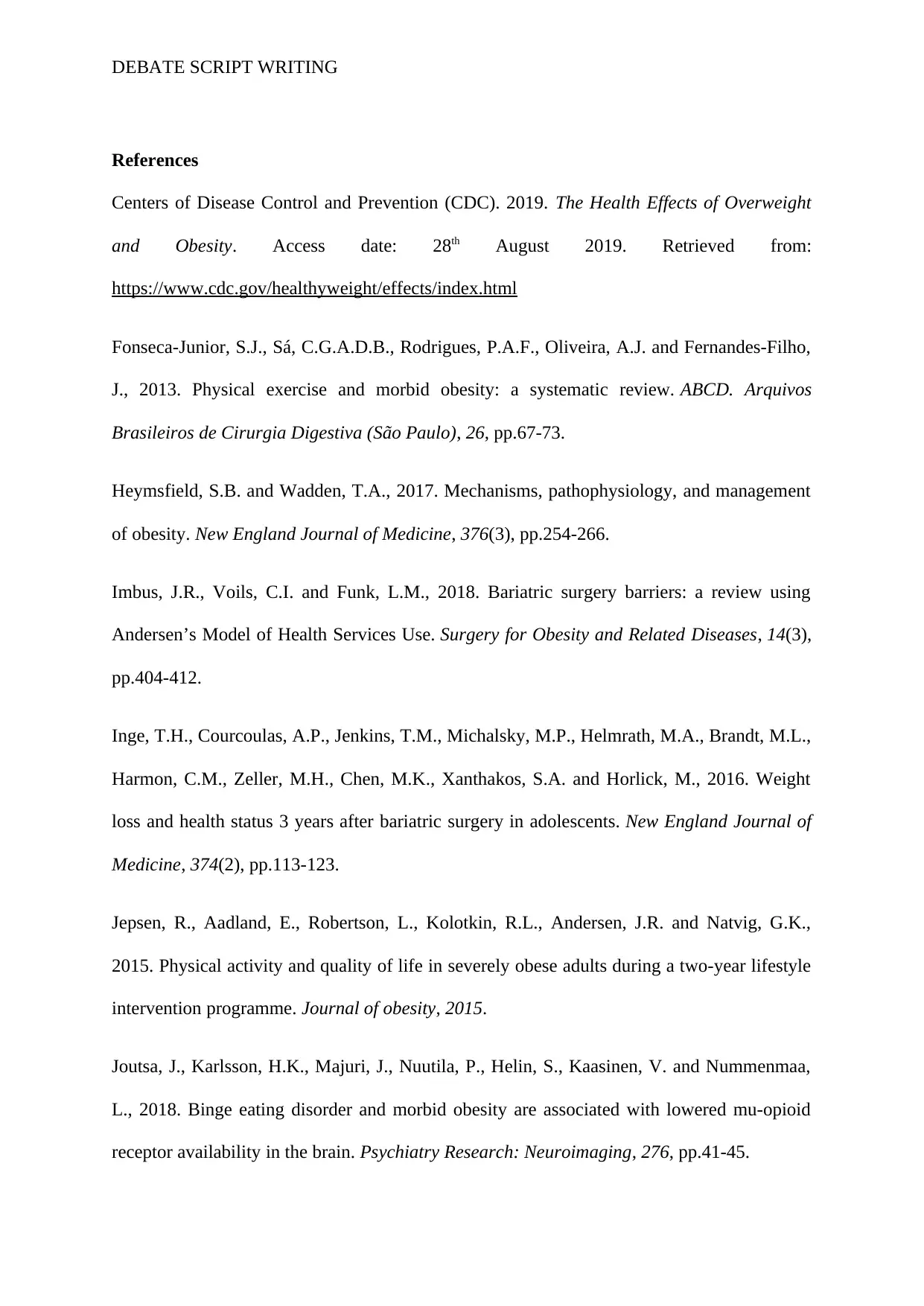
DEBATE SCRIPT WRITING
References
Centers of Disease Control and Prevention (CDC). 2019. The Health Effects of Overweight
and Obesity. Access date: 28th August 2019. Retrieved from:
https://www.cdc.gov/healthyweight/effects/index.html
Fonseca-Junior, S.J., Sá, C.G.A.D.B., Rodrigues, P.A.F., Oliveira, A.J. and Fernandes-Filho,
J., 2013. Physical exercise and morbid obesity: a systematic review. ABCD. Arquivos
Brasileiros de Cirurgia Digestiva (São Paulo), 26, pp.67-73.
Heymsfield, S.B. and Wadden, T.A., 2017. Mechanisms, pathophysiology, and management
of obesity. New England Journal of Medicine, 376(3), pp.254-266.
Imbus, J.R., Voils, C.I. and Funk, L.M., 2018. Bariatric surgery barriers: a review using
Andersen’s Model of Health Services Use. Surgery for Obesity and Related Diseases, 14(3),
pp.404-412.
Inge, T.H., Courcoulas, A.P., Jenkins, T.M., Michalsky, M.P., Helmrath, M.A., Brandt, M.L.,
Harmon, C.M., Zeller, M.H., Chen, M.K., Xanthakos, S.A. and Horlick, M., 2016. Weight
loss and health status 3 years after bariatric surgery in adolescents. New England Journal of
Medicine, 374(2), pp.113-123.
Jepsen, R., Aadland, E., Robertson, L., Kolotkin, R.L., Andersen, J.R. and Natvig, G.K.,
2015. Physical activity and quality of life in severely obese adults during a two-year lifestyle
intervention programme. Journal of obesity, 2015.
Joutsa, J., Karlsson, H.K., Majuri, J., Nuutila, P., Helin, S., Kaasinen, V. and Nummenmaa,
L., 2018. Binge eating disorder and morbid obesity are associated with lowered mu-opioid
receptor availability in the brain. Psychiatry Research: Neuroimaging, 276, pp.41-45.
References
Centers of Disease Control and Prevention (CDC). 2019. The Health Effects of Overweight
and Obesity. Access date: 28th August 2019. Retrieved from:
https://www.cdc.gov/healthyweight/effects/index.html
Fonseca-Junior, S.J., Sá, C.G.A.D.B., Rodrigues, P.A.F., Oliveira, A.J. and Fernandes-Filho,
J., 2013. Physical exercise and morbid obesity: a systematic review. ABCD. Arquivos
Brasileiros de Cirurgia Digestiva (São Paulo), 26, pp.67-73.
Heymsfield, S.B. and Wadden, T.A., 2017. Mechanisms, pathophysiology, and management
of obesity. New England Journal of Medicine, 376(3), pp.254-266.
Imbus, J.R., Voils, C.I. and Funk, L.M., 2018. Bariatric surgery barriers: a review using
Andersen’s Model of Health Services Use. Surgery for Obesity and Related Diseases, 14(3),
pp.404-412.
Inge, T.H., Courcoulas, A.P., Jenkins, T.M., Michalsky, M.P., Helmrath, M.A., Brandt, M.L.,
Harmon, C.M., Zeller, M.H., Chen, M.K., Xanthakos, S.A. and Horlick, M., 2016. Weight
loss and health status 3 years after bariatric surgery in adolescents. New England Journal of
Medicine, 374(2), pp.113-123.
Jepsen, R., Aadland, E., Robertson, L., Kolotkin, R.L., Andersen, J.R. and Natvig, G.K.,
2015. Physical activity and quality of life in severely obese adults during a two-year lifestyle
intervention programme. Journal of obesity, 2015.
Joutsa, J., Karlsson, H.K., Majuri, J., Nuutila, P., Helin, S., Kaasinen, V. and Nummenmaa,
L., 2018. Binge eating disorder and morbid obesity are associated with lowered mu-opioid
receptor availability in the brain. Psychiatry Research: Neuroimaging, 276, pp.41-45.

DEBATE SCRIPT WRITING
Maciejewski, M.L., Arterburn, D.E., Van Scoyoc, L., Smith, V.A., Yancy, W.S.,
Weidenbacher, H.J., Livingston, E.H. and Olsen, M.K., 2016. Bariatric surgery and long-term
durability of weight loss. JAMA surgery, 151(11), pp.1046-1055.
Maciejewski, M.L., Arterburn, D.E., Van Scoyoc, L., Smith, V.A., Yancy, W.S.,
Weidenbacher, H.J., Livingston, E.H. and Olsen, M.K., 2016. Bariatric surgery and long-term
durability of weight loss. JAMA surgery, 151(11), pp.1046-1055.
⊘ This is a preview!⊘
Do you want full access?
Subscribe today to unlock all pages.

Trusted by 1+ million students worldwide
1 out of 6
Related Documents
Your All-in-One AI-Powered Toolkit for Academic Success.
+13062052269
info@desklib.com
Available 24*7 on WhatsApp / Email
![[object Object]](/_next/static/media/star-bottom.7253800d.svg)
Unlock your academic potential
Copyright © 2020–2026 A2Z Services. All Rights Reserved. Developed and managed by ZUCOL.





